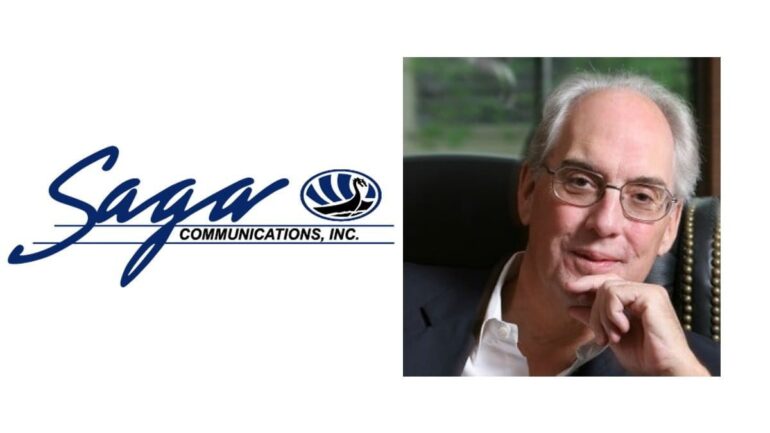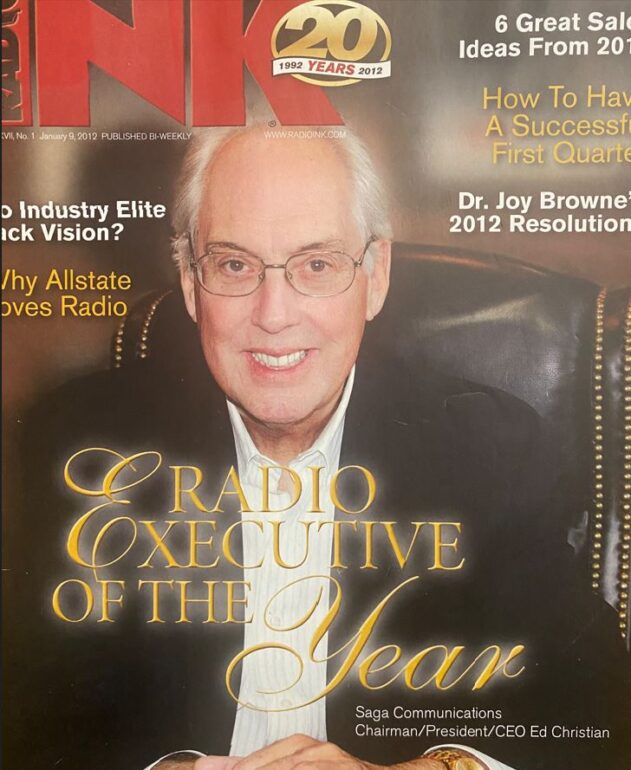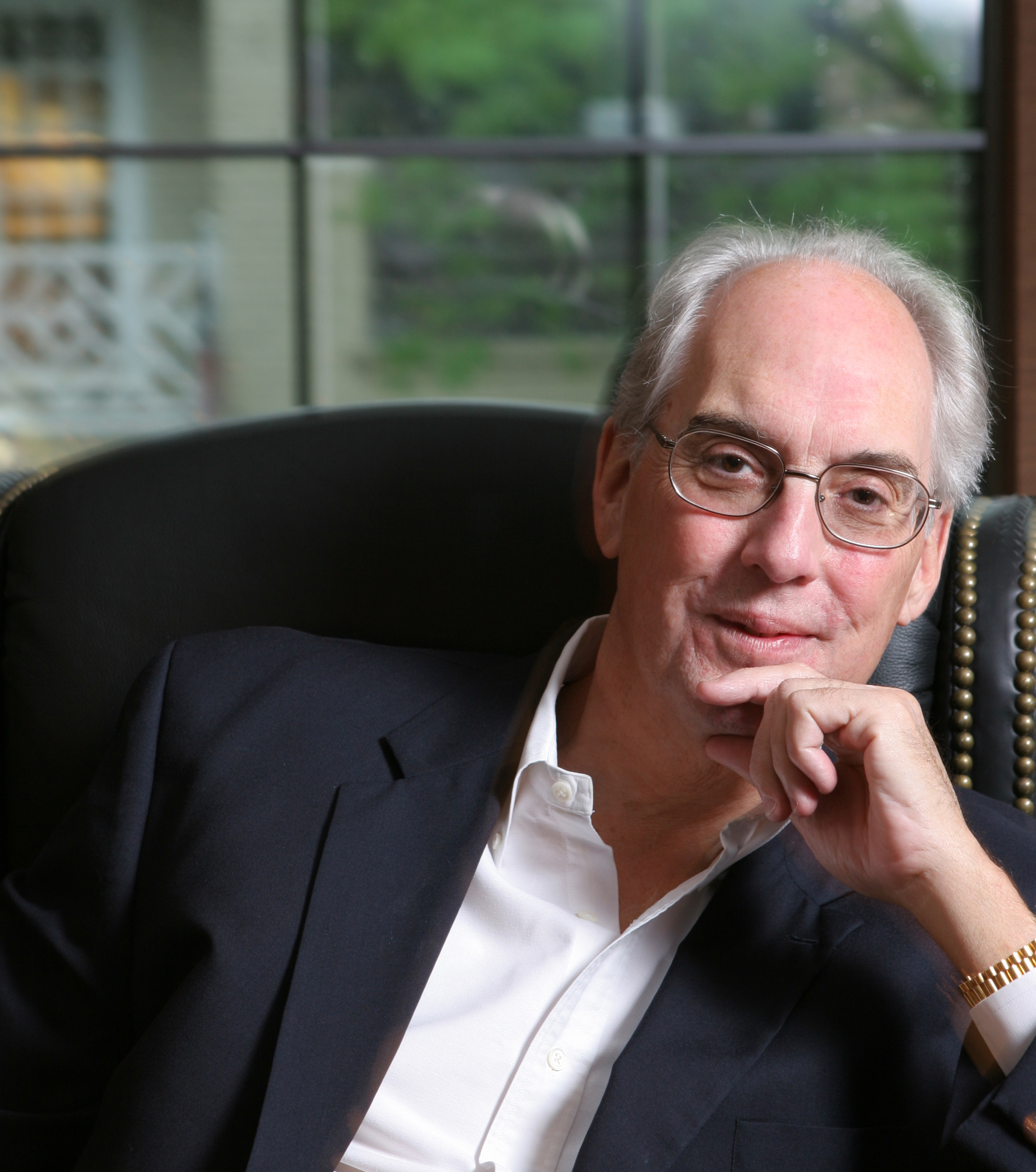The Saga of Ed Christian: A Radio Pioneer’s Enduring Legacy
 In American radio broadcasting, few names resonate as powerfully as Ed Christian. As the founder, chairman, president, and CEO of Saga Communications, Christian’s career spanned over five decades, leaving an indelible mark on the industry. His journey from a teenage disc jockey to a titan of radio was marked by a relentless commitment to localism, innovative programming, and a leadership style that blended iconoclasm with compassion. Christian’s passing on August 19, 2022, at the age of 78, after a short illness, prompted an outpouring of tributes from colleagues, industry leaders, and listeners, all of whom recognized him as a visionary who never lost sight of radio’s “true north.” This article explores Christian’s career path, his contributions to radio broadcasting, his philosophy, and the relationships he forged, with a particular focus on his transformative work at WNIC Detroit, WSNY Columbus, and his leadership at Saga Communications and Josephson International.
In American radio broadcasting, few names resonate as powerfully as Ed Christian. As the founder, chairman, president, and CEO of Saga Communications, Christian’s career spanned over five decades, leaving an indelible mark on the industry. His journey from a teenage disc jockey to a titan of radio was marked by a relentless commitment to localism, innovative programming, and a leadership style that blended iconoclasm with compassion. Christian’s passing on August 19, 2022, at the age of 78, after a short illness, prompted an outpouring of tributes from colleagues, industry leaders, and listeners, all of whom recognized him as a visionary who never lost sight of radio’s “true north.” This article explores Christian’s career path, his contributions to radio broadcasting, his philosophy, and the relationships he forged, with a particular focus on his transformative work at WNIC Detroit, WSNY Columbus, and his leadership at Saga Communications and Josephson International.
Early Beginnings: A Passion for Radio Ignited
Born in 1944 in St. Helen, Michigan, Ed Christian’s fascination with radio began early. At 16, he landed his first broadcasting job at a small station in northern Michigan, earning $52 a week—a sum equivalent to roughly $400 today, adjusted for inflation. This early gig, operating the control board and working as a weekend anchor, sparked a lifelong passion for the medium. Christian’s small-town roots shaped his understanding of radio’s role in connecting communities, a principle that would define his career.
After graduating from Wayne State University in 1966 with a bachelor’s degree in mass communications, Christian took a job as an account executive at WCAR-AM-FM in Detroit. His college years were spent honing his skills at stations in Roger City, Lansing, and Flint, where he juggled roles as a weekend anchor and salesperson. These experiences gave him a ground-level view of radio’s inner workings, from programming to sales, which would later inform his strategic vision. Christian furthered his education with a master’s degree in management from Central Michigan University, equipping him with the business acumen to navigate the competitive broadcasting landscape.
At 26, Christian took a bold step, purchasing WCER-AM-FM in Charlotte, Michigan, in 1970. Owning a station in a small market was a gamble, but it showcased his entrepreneurial spirit. Three years later, he sold the stations to take on a pivotal role that would elevate his profile in the industry: vice president and general manager of WNIC-AM-FM in Detroit.
Turning Around WNIC: A Defining Moment
In 1974, Christian was tasked with reviving WNIC, a struggling Detroit station repossessed by State Mutual Life Insurance Co. At the time, WNIC was bleeding money, but Christian’s leadership turned it around in just three months, transforming it into one of Detroit’s most influential stations. His approach was rooted in innovative programming and a deep respect for the audience and advertisers. “If you have compelling radio that serves your community, if you have great people, if you treat advertisers with respect, then profits will follow,” Christian later said, encapsulating his philosophy.
WNIC’s turnaround was a testament to Christian’s ability to blend creative programming with business savvy. Under his stewardship from 1974 to 1984, the station became a market leader, known for its engaging content and strong community ties. His tenure at WNIC not only solidified his reputation as a turnaround specialist but also caught the attention of Josephson International, where he would take on an even larger role.
Rising Through Josephson International
In the late 1970s, Christian joined Josephson Communications, initially as executive vice president and later as president. Josephson International was a growing media company with a portfolio of radio stations, and Christian’s leadership helped expand its reach. His decade-long tenure at Josephson was marked by strategic acquisitions and operational improvements, setting the stage for his most ambitious venture yet.
In 1986, Christian raised $38.5 million to buy out Josephson International’s radio division, which included three AM and five FM stations. He renamed the company Saga Communications, drawing inspiration from the Nordic word “saga,” meaning an ongoing adventure. “This is how I view my company and my life,” Christian said. “Our company is really an ongoing adventure.” This marked the birth of Saga Communications, a company that would become a powerhouse in mid-sized markets under his leadership.
Building Saga Communications: A Commitment to Localism
 Saga Communications, founded in 1986 and headquartered in Grosse Pointe Farms, Michigan, grew rapidly under Christian’s guidance. By 1992, it became a publicly traded company on the Nasdaq under the ticker “SGA,” a milestone that reflected Christian’s ability to scale the business while maintaining its core values. At its peak, Saga owned 79 FM stations, 35 AM stations, and 80 translators across 27 markets, with additional interests in television stations and radio networks in Illinois, Michigan, and Minnesota.
Saga Communications, founded in 1986 and headquartered in Grosse Pointe Farms, Michigan, grew rapidly under Christian’s guidance. By 1992, it became a publicly traded company on the Nasdaq under the ticker “SGA,” a milestone that reflected Christian’s ability to scale the business while maintaining its core values. At its peak, Saga owned 79 FM stations, 35 AM stations, and 80 translators across 27 markets, with additional interests in television stations and radio networks in Illinois, Michigan, and Minnesota.
Christian’s broadcasting philosophy was rooted in localism, a belief that radio’s power lies in its ability to connect with communities. “At Saga Communications, we believe local media has the power to affect communities,” the company stated. This ethos drove Saga’s strategy of acquiring top-billing stations in mid-sized markets, such as Columbus, Ohio, and Milwaukee, Wisconsin, and using innovative programming and marketing to dominate advertising revenue. Christian’s focus on live and local talent set Saga apart in an era when many broadcasters chased digital trends or consolidated operations.
One of Saga’s flagship stations, WSNY in Columbus, Ohio, exemplified Christian’s vision. Acquired through Saga’s subsidiary Franklin Communications, WSNY (known as “Sunny 95”) became a market leader in adult contemporary radio, thanks to its community-focused programming and strong listener engagement. Christian’s hands-on approach ensured that WSNY and other Saga stations maintained a distinct local identity, even as the industry faced pressures to homogenize.
Christian was also an early adopter of FM translators, which he dubbed “metro stations” to enhance their appeal to advertisers. These translators allowed Saga to introduce new formats, such as Outlaw Radio, to local markets, expanding listenership without sacrificing quality. His innovative use of HD Radio and translators positioned Saga as a leader in adapting to technological shifts while staying true to radio’s core mission.
Leadership Style: Iconoclastic Yet Collaborative
Christian’s leadership style was a blend of bold vision and personal warmth. Described as an “admitted iconoclast,” he often zigged when others zagged, resisting industry fads in favor of his own principles. During a 2012 earnings call, he criticized the industry’s obsession with digital platforms, arguing that radio’s strength lay in its on-air content. “A lot of companies have been focusing on the icing of the cupcake, rather than the cupcake itself,” he said, emphasizing the enduring value of quality broadcasting.
Yet, Christian was not dogmatic. He was open to new ideas when they aligned with his vision, as evidenced by Saga’s selective use of streaming in larger markets and its embrace of FM translators. His willingness to challenge conventional wisdom—such as pulling Saga’s streams in smaller markets to avoid rising royalty costs—demonstrated his fiscal conservatism and strategic foresight.
Colleagues described Christian as both a mentor and a friend. Bill Velez, executive director of the Radio Music License Committee, recalled meeting Christian in the 1970s when Christian was at WNIC and Velez was an account executive at ASCAP. Their professional relationship evolved into a deep friendship, with Velez crediting Christian’s guidance during tough times. “Some thirty years later, I literally found myself on my knees one day seeking spiritual help because I had all but run out of dough,” Velez shared, noting Christian’s support during his financial struggles.
Erica Farber, president and CEO of the Radio Advertising Bureau, praised Christian’s authenticity: “He was a true broadcaster through and through. He built a strong company with strong talent.” Farber noted his habit of adding a happy face to notes when pleased with an outcome, a small gesture that reflected his approachable nature. Steve Goldstein, Saga’s former head of programming, described working with Christian as “an ongoing master class,” citing his knowledge, innovation, and perspective.
Christian’s leadership extended beyond Saga. He served as chairman of the Radio Music License Committee, where he advocated for favorable royalty rates for broadcasters, and held board positions with the National Association of Broadcasters (NAB), the Michigan Association of Broadcasting, and other organizations. His commitment to public service was evident in his roles with the National Autoimmune Related Disease Association and St. John Hospital in Detroit, as well as his position as an Honorary Consul for Iceland.
Christian’s contributions to radio were recognized with numerous accolades. In 2009, he received the NAB’s National Radio Award for his leadership and commitment to public service. NAB executive vice president John David praised Christian’s focus on localism: “While Ed Christian has served tirelessly as a national leader for radio, he has never forgotten that the most successful stations are those that have deep roots in their local communities.” In 2012, the Michigan Association of Broadcasters honored him with a Lifetime Achievement Award, and Radio Ink named him one of the most influential radio executives in the U.S.
Christian’s academic contributions were equally significant. As an adjunct professor at Central Michigan University’s School of Broadcast and Cinematic Arts, he shared his expertise with students, emphasizing the importance of understanding the industry from the inside. “As good as the professors are, they’re not working in the industry on a day-to-day basis,” he said, reflecting on the value of real-world insights. His lectures covered audience measurement, programming trends, and marketing, offering practical advice to aspiring broadcasters.
Saga’s growth under Christian’s leadership was a testament to his business acumen. By 2022, the company had expanded to 104 stations and 80 translators across 27 markets, with a market cap that reflected its status as a dominant player in mid-sized markets. Saga’s inclusion in Forbes’ list of the 200 Best Small Companies in America underscored its financial success and operational excellence.
Christian’s relationships with colleagues were built on mutual respect and shared passion for radio. Warren Lada, who joined Saga in 1991 as general manager of WAQY in Springfield, Massachusetts, and later became COO, was appointed interim CEO after Christian’s passing. Lada’s long tenure with Saga reflected the loyalty Christian inspired. Curtis LeGeyt, NAB president and CEO, lauded Christian’s impact: “Ed Christian built Saga Communications into one of the preeminent radio groups in the country through keen business sense and a deep understanding of the power of local radio.”
Christian’s personal connections extended to his family, who shared his commitment to community and education. He was survived by his wife, Judy, daughter Dana Raymant, and son Eric Christian, all of whom supported his involvement with Wayne State University, where he was a Charter Society Member of the Anthony Wayne Society. In 2015, Wayne State honored him with a Distinguished Alumni Award, recognizing his contributions to broadcasting and his alma mater.
The Significance of WNIC and WSNY
WNIC Detroit and WSNY Columbus were cornerstones of Christian’s legacy. WNIC’s turnaround in the 1970s showcased his ability to revitalize struggling stations through innovative programming and community engagement. The station’s success laid the foundation for his later achievements at Josephson and Saga, proving that a focus on quality content and local relevance could yield profitability.
WSNY, meanwhile, became a model for Saga’s strategy in mid-sized markets. As part of Saga’s Columbus cluster, WSNY’s adult contemporary format and strong community presence made it a top performer. Christian’s emphasis on local talent and programming ensured that WSNY resonated with listeners, reinforcing his belief that radio’s strength lies in its connection to the audience.
Ed Christian’s death in 2022 marked the end of an era, but his legacy endures. Radio Ink founder Eric Rhoads described him as “one of the brightest, most innovative, and most unconventional” executives, noting his refusal to follow industry trends blindly. Christian’s focus on the “cupcake itself”—the core of radio broadcasting—reminded the industry of its roots at a time when digital distractions threatened to overshadow its mission.
Christian’s philosophy of localism, his innovative use of technology, and his mentorship of colleagues and students have left a lasting imprint on radio. As an amateur radio operator with the call sign W8EKC, he remained connected to the medium’s grassroots, never losing the passion that drove him as a teenager. His work at WNIC, WSNY, Josephson International, and Saga Communications transformed the industry, proving that radio could thrive by staying true to its community-focused roots.
In the words of Saga’s statement following his passing, “Ed will be missed but not forgotten. He is and was a true radio broadcaster that never lost sight of his ‘true north’ in an industry he loved.” For those who worked with him, listened to his stations, or learned from his teachings, Ed Christian’s saga remains an ongoing adventure, inspiring the next generation of broadcasters to carry the torch.
Written by: Barry Wright
Ed Christian Josephson International Saga Saga Communications WNIC WSNY
Similar posts
Most Liked Airchecks
Events
Support Aircheck Radio
Copyright 2025 Aircheck Radio is a proud listener supported 501(c)(3) nonprofit organization





Post comments (0)